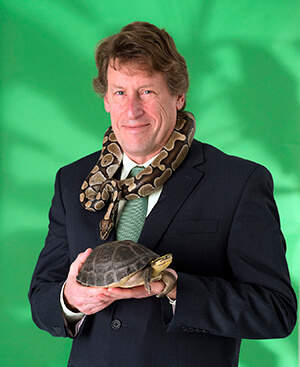March 30, 2017
Purdue Profiles: Bruce Kingsbury
 Bruce Kingsbury, professor of biology, associate dean of arts and sciences and the director of the IPFW Environmental Resources Center. (Photo provided)
Download image
Bruce Kingsbury, professor of biology, associate dean of arts and sciences and the director of the IPFW Environmental Resources Center. (Photo provided)
Download image
As a boy, Bruce Kingsbury, professor of biology, associate dean of arts and sciences and the director of the IPFW Environmental Resources Center, spent most of his time outside trying to catch snakes. As he grew up, he converted a fascination with the slithering reptiles into a career at Indiana University-Purdue University Fort Wayne.
Kingsbury has a bachelor's degree in biology from Pomona State College in Claremont, California, a master's in biology from San Diego State University and a doctorate in biology from the University of California, Riverside.
What does your work/research focus on and why is it important?
The principal focus of my work has been the ecology and conservation of imperiled reptiles. Over the last 20 years, I have established a reputation as an expert on several species of snake and turtle. The research of my team focuses at times on the basic ecological attributes relating to habitat use and patterns of movement, but also on applied topics such as the effects of fire on wildlife. Sticking with that example, land managers commonly use purposeful burning, or “prescribed fire,” as a tool to control vegetation. I evaluate how they might engage in such activities while minimizing the negative consequences.
My work is important because it helps clarify how to protect species that are in trouble from further harm from human actions. The animals I work on are likely not economically important, but we are legally, if not ethically, compelled to protect them. And I will say that to me, wildlife has intrinsic value that we should value and protect.
How does this work/research affect the IPFW community?
Perhaps most importantly, my research activity provides a wealth of opportunities for students to work on wildlife ecology and conservation. Believe it or not, there are many people quite keen on studying snakes!
Another benefit to IPFW family from the public face of my efforts is increased visibility of the university in the larger community, which subsequently helps us with branding, community support and enrollment.
How does it affect the surrounding community?
I serve as a resource for state and federal agencies, nonprofit organizations and the general public about wildlife and land management. An outgrowth of my desire to get out of the “ivory tower” and share the findings of my research with decision makers led to the founding of the Center for Reptile and Amphibian Conservation and Management in 2000. This was the first center of excellence at IPFW. In 2012, the center was rebranded as the Environmental Resources Center, allowing me to broaden the field of inquiry and focus more attention on local issues.
What inspired you to focus on this particular work/research?
I liked animals in general and reptiles in particular since I was a little boy. I found snakes to be absolutely fascinating. I spent a great deal of my childhood wandering around outside looking for snakes and catching crickets to feed my pet lizards. I wanted to know everything about them. By the time I was 10, I had repeatedly read all of the books on reptiles available in my library. I wanted to be a professor of herpetology, though I really did not know what that meant.
My thinking about why I do what I do professionally has evolved over time. While I was a student, I was still satisfied with my childhood justification that research on the animals was worthy of study simply because they were interesting to me. I first became aware that this was no longer sufficient for me when I had almost finished my doctoral studies and someone at a party asked me why I was doing my research on reptiles. My standard answer, that they were “neat,” rang hollow. That was the beginning of my conscious pivot to focusing on how to protect wildlife rather than just learn about them. Since then, I have gradually devoted more of my time and energy to applied ecology, with the intention of positively influencing land management practices to benefit “nongame”, that is, those animals that are not hunted for sport or food.
What is the most rewarding part of your work/research?
I really like buying new pieces of equipment that will let us do things better or pursue new lines of inquiry. Things like a better camera, tracking device or clever piece of software to facilitate visualization and analysis.
I may have the most fun talking about my group’s research findings, especially to interested adults in the community. Speaking to such an audience is not as stressful as to peers at a professional conference, but the attendees are eager to learn, and appreciative of the opportunities I provide.
Writer: Megan Huckaby, 765-496-1325, mhuckaby@purdue.edu

